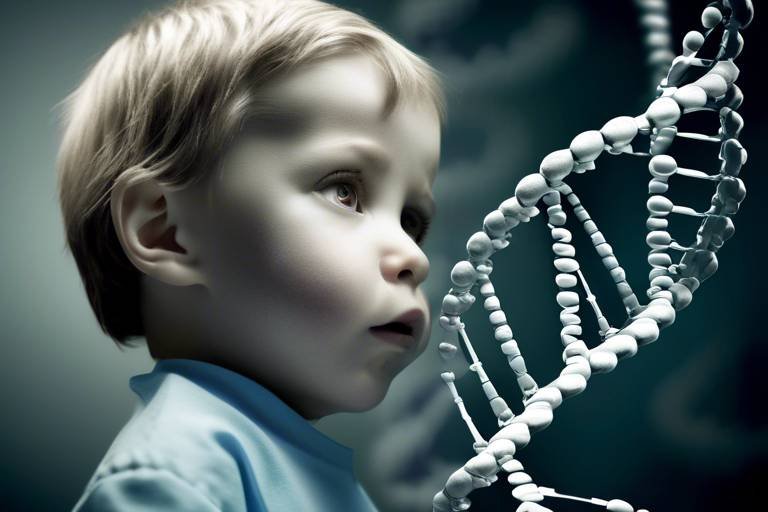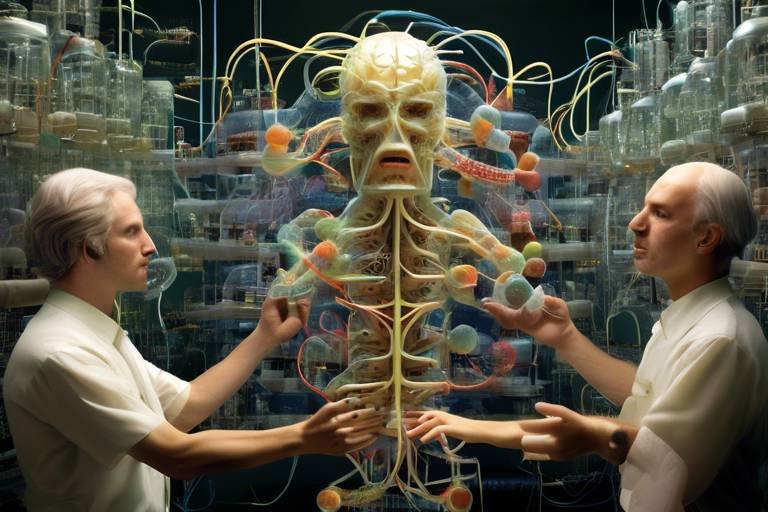DNA Manipulation - The Ethical Dilemma
As we stand on the brink of a new era in science and technology, DNA manipulation has emerged as a topic of heated debate. The ability to edit the very building blocks of life has opened up a world of possibilities, but it also brings forth a myriad of ethical dilemmas that society must grapple with. Imagine being able to eradicate genetic diseases or enhance agricultural productivity; it sounds like something out of a science fiction novel, right? Yet, the reality is that these advancements are not just theoretical—they are happening now.
At the core of this discussion is the question: What does it mean to play God? With tools like CRISPR and other gene-editing technologies, we can alter DNA sequences with unprecedented precision. This capability raises important questions about our responsibilities as stewards of the genetic code. Are we equipped to handle the consequences of our actions? The potential to manipulate DNA could lead to significant breakthroughs in medicine, agriculture, and even environmental conservation, but it also poses risks that we cannot ignore.
One of the most pressing concerns is the potential for inequality. If only a select few have access to these technologies, could we be creating a society where genetic enhancements lead to a new form of elitism? The idea of designer babies—children whose traits are selected based on parental preferences—sparks outrage and fascination in equal measure. While the promise of eradicating hereditary diseases is alluring, the implications of choosing traits like intelligence or physical appearance raise ethical flags that cannot be easily dismissed.
Moreover, the impact of genetically modified organisms (GMOs) in agriculture has transformed food production, promising to feed a growing global population. However, this advancement is not without its critics. The introduction of GMOs into our ecosystems may have unforeseen consequences, disrupting natural balances and affecting biodiversity. As we venture further into this uncharted territory, we must ask ourselves: At what cost?
In essence, the ethical dilemma surrounding DNA manipulation is a complex tapestry of hope and apprehension. As we navigate through these turbulent waters, it is crucial to establish robust regulations and oversight mechanisms. This will ensure that the benefits of DNA manipulation are realized while minimizing risks and ethical breaches. The future of genetic engineering will undoubtedly require a delicate balance between innovation and responsibility, prompting ongoing discussions about its role in shaping our world.
- What is DNA manipulation? - DNA manipulation refers to the techniques used to alter the genetic material of an organism, including gene editing technologies like CRISPR.
- What are the potential benefits of DNA manipulation? - Benefits include advancements in medicine, agriculture, and environmental conservation, such as curing genetic disorders and improving crop yields.
- What are the ethical concerns associated with DNA manipulation? - Concerns include genetic inequality, the creation of designer babies, and the environmental impact of GMOs.
- How can we ensure responsible use of DNA manipulation technologies? - Establishing strict regulations and oversight is essential to balance innovation with ethical considerations.

The Science of DNA Manipulation
Understanding the fundamental principles of DNA manipulation is essential to grasp the vast potential it holds across various fields. At its core, DNA manipulation involves altering the genetic material of an organism, which can lead to significant advancements in science and medicine. One of the most revolutionary technologies in this domain is CRISPR (Clustered Regularly Interspaced Short Palindromic Repeats), a powerful tool that allows scientists to edit genes with remarkable precision. This groundbreaking technique has made it possible to target specific sequences of DNA, enabling researchers to add, remove, or alter genetic material.
CRISPR works by utilizing a guide RNA that directs the CRISPR-associated protein (Cas9) to the precise location in the genome where a change is desired. Once there, Cas9 acts like a pair of molecular scissors, cutting the DNA at the targeted site. This process can lead to various outcomes, including the correction of genetic defects or the introduction of new traits. The implications of this technology are profound, and its applications range from medical therapies to agricultural enhancements.
In addition to CRISPR, other gene editing techniques, such as Zinc Finger Nucleases (ZFNs) and Transcription Activator-Like Effector Nucleases (TALENs), have paved the way for innovations in genetic research. Each method has its own strengths and weaknesses, but they all share a common goal: to enable precise modifications to DNA, which can lead to breakthroughs in treating diseases, improving crop resilience, and addressing environmental challenges.
As we delve deeper into the science of DNA manipulation, it’s crucial to consider the ethical implications that arise from these advancements. For instance, while the ability to edit genes offers the potential to eradicate genetic disorders, it also raises questions about consent, equity, and the long-term effects on future generations. The balance between innovation and responsibility is a delicate one, and ongoing discussions about the ethical use of these technologies are essential.
To further illustrate the advancements in DNA manipulation, let’s compare the three primary gene editing techniques:
| Technique | Precision | Ease of Use | Applications |
|---|---|---|---|
| CRISPR | High | Easy | Medicine, Agriculture |
| Zinc Finger Nucleases | Moderate | Moderate | Gene Therapy |
| TALENs | High | Complex | Research, Agriculture |
This table highlights the strengths and applications of each technology, showcasing how they contribute to the evolving landscape of genetic research. As we continue to explore the science of DNA manipulation, we must remain vigilant about the ethical considerations that accompany these powerful tools. The journey of understanding and harnessing the potential of DNA manipulation is just beginning, and it holds the promise of transforming our world in ways we can only begin to imagine.
- What is DNA manipulation? DNA manipulation refers to the process of altering the genetic material of an organism to achieve desired traits or outcomes.
- How does CRISPR work? CRISPR uses a guide RNA to direct the Cas9 protein to a specific location in the DNA, where it makes precise cuts to edit the genetic material.
- What are the ethical concerns surrounding DNA manipulation? Ethical concerns include issues of consent, equity in access to technology, and the potential long-term effects on future generations.

Potential Benefits of DNA Manipulation
DNA manipulation is not just a buzzword; it’s a revolutionary concept that holds the potential to change the world as we know it. Imagine a world where genetic disorders could be corrected before they even manifest, where crops are engineered to withstand the harshest climates, and where biodiversity is preserved through innovative techniques. This is the promise that DNA manipulation brings to the table. The potential benefits span across various fields, including medicine, agriculture, and environmental conservation, making it a topic worthy of both excitement and scrutiny.
One of the most significant areas where DNA manipulation shines is in gene therapy. This groundbreaking approach aims to treat genetic disorders by correcting the underlying genetic defects. For instance, diseases like cystic fibrosis or sickle cell anemia could potentially be treated by simply fixing the faulty genes responsible for these conditions. The implications are staggering: not only could we improve the quality of life for millions, but we could also significantly reduce healthcare costs associated with chronic diseases. A study published in a leading medical journal projected that successful gene therapy could save the healthcare system billions in the long run.
Another promising application is in the field of agriculture. With the global population projected to reach 9.7 billion by 2050, food security is a pressing concern. DNA manipulation allows for the creation of genetically modified organisms (GMOs) that can produce higher yields and resist pests and diseases. For example, crops engineered to be drought-resistant can thrive in arid conditions, ensuring that food production remains stable even in challenging climates. The following table illustrates some of the benefits of GMOs:
| Benefit | Description |
|---|---|
| Increased Yield | Genetically modified crops can produce more food per acre, helping to feed a growing population. |
| Pest Resistance | GMOs can be engineered to resist pests, reducing the need for chemical pesticides. |
| Disease Resistance | Modified crops can be more resilient to diseases, ensuring a stable food supply. |
| Nutritional Enhancement | Crops can be fortified with vitamins and minerals, addressing nutritional deficiencies in populations. |
Moreover, DNA manipulation plays a crucial role in environmental conservation. As we face the dire consequences of climate change, innovative genetic engineering techniques can help preserve endangered species and restore ecosystems. For instance, scientists are exploring ways to enhance the resilience of certain species to adapt to changing environmental conditions. The potential to create organisms that can thrive in polluted environments could also lead to breakthroughs in bioremediation.
In summary, the potential benefits of DNA manipulation are vast and varied. From improving human health through gene therapy to enhancing food security with GMOs and aiding in environmental conservation, the possibilities are truly exciting. However, as we tread this path, it’s essential to balance these advancements with ethical considerations to ensure that we harness the power of DNA manipulation responsibly.
- What is DNA manipulation? - DNA manipulation refers to the techniques used to alter the genetic material of an organism, including gene editing and genetic engineering.
- What are the potential benefits of DNA manipulation? - Benefits include advancements in gene therapy, increased agricultural yields, enhanced food security, and environmental conservation efforts.
- Are there risks associated with DNA manipulation? - Yes, potential risks include ethical dilemmas, unintended consequences, and environmental impacts that need careful consideration.
- How is gene therapy different from traditional treatments? - Gene therapy aims to address the root cause of genetic disorders by correcting faulty genes, while traditional treatments often focus on managing symptoms.

Gene Therapy and Disease Prevention
Gene therapy is not just a buzzword; it represents a revolutionary shift in how we approach genetic disorders. Imagine a world where diseases caused by faulty genes could be corrected at their source. This is the promise of gene therapy, where scientists can edit genes and potentially eradicate hereditary conditions before they even manifest. The technology behind this is fascinating, employing techniques like CRISPR to target specific genes, making it feel like we are wielding a genetic scalpel.
At the heart of gene therapy is the concept of disease prevention. Instead of merely treating symptoms, gene therapy aims to eliminate the root cause of illnesses. For example, consider conditions like cystic fibrosis or sickle cell anemia, which stem from specific genetic mutations. By correcting these mutations, we could not only improve the quality of life for those affected but also significantly reduce healthcare costs associated with long-term treatment. However, this raises a critical question: How do we ensure that these treatments are accessible to everyone?
Moreover, the potential of gene therapy extends beyond treating genetic disorders. It holds promise for preventing diseases that have a genetic component, such as certain cancers and heart diseases. By identifying individuals at risk due to their genetic makeup, we can use gene therapy to modify their genes, effectively reducing their risk of developing these conditions. This proactive approach could reshape the landscape of healthcare, shifting our focus from treatment to prevention.
However, while the benefits are substantial, ethical considerations loom large. Questions about consent, especially in pediatric cases, and the long-term effects of such interventions on individuals and future generations are paramount. Are we ready to navigate the murky waters of genetic modification? The implications of gene therapy extend beyond the individual; they ripple through families and communities, raising concerns about equity and access.
To illustrate the potential of gene therapy, consider the following table that outlines some key genetic disorders and the corresponding gene therapies currently in development or use:
| Disease | Gene Therapy Approach | Status |
|---|---|---|
| Cystic Fibrosis | Correction of CFTR gene | In clinical trials |
| Sickle Cell Anemia | Gene editing to correct HBB gene | Approved for use |
| Hemophilia | Replacement of defective clotting factor genes | In clinical trials |
In summary, gene therapy stands at the forefront of a new era in medicine, offering hope for disease prevention and treatment. However, as we advance, we must tread carefully, ensuring that the benefits of these groundbreaking therapies are equitably distributed while addressing the ethical dilemmas they present. The future of healthcare may very well depend on how we navigate these challenges.
- What is gene therapy? Gene therapy is a technique that modifies a person's genes to treat or prevent disease.
- How does gene therapy work? It works by correcting or replacing defective genes, using methods like CRISPR technology.
- What diseases can gene therapy treat? Gene therapy can treat a variety of genetic disorders, including cystic fibrosis, sickle cell anemia, and hemophilia.
- Are there risks associated with gene therapy? Yes, there are potential risks, including unintended genetic changes and ethical concerns regarding access and consent.

Ethical Considerations in Gene Therapy
Gene therapy is often hailed as a revolutionary breakthrough in the medical field, offering the potential to correct genetic disorders at their source. However, this exciting frontier also brings with it a host of ethical dilemmas that must be carefully navigated. One of the key concerns is the issue of informed consent. Patients undergoing gene therapy need to fully understand the risks and benefits involved, which can be complex and multifaceted. Are they truly able to make an informed decision, especially when the science is still evolving?
Another pressing issue is access to treatment. If gene therapy becomes a standard treatment option, will it be available to all, or will it be a privilege reserved for the wealthy? This disparity raises questions about genetic inequality, where only those who can afford such treatments have access to potentially life-saving therapies. The implications of this could be staggering, leading to a society where genetic enhancements are available only to the elite, further widening the gap between different socio-economic classes.
Moreover, there's the concern of unintended consequences. While the goal is to correct genetic defects, what happens when the changes made to one gene inadvertently affect others? This could lead to unforeseen health issues that might not manifest until years down the line. The long-term effects of gene therapy are still largely unknown, making it crucial for researchers and ethicists to tread carefully in this uncharted territory.
Additionally, the concept of designer babies raises profound ethical questions. If parents can choose traits for their children, what does that mean for the definition of normalcy? Will society pressure individuals to conform to certain genetic ideals? This possibility paints a dystopian picture where genetic selection could lead to a new form of discrimination based on genetic traits.
To address these ethical considerations, it is essential for regulatory bodies to establish clear guidelines and oversight mechanisms. This ensures that gene therapy is not only effective but also conducted in a manner that respects the rights and dignity of patients. The conversation surrounding gene therapy must include not just scientists and healthcare providers, but also ethicists, policymakers, and the public. Only through a collaborative approach can we navigate the complex landscape of gene therapy and its implications for society.
- What is gene therapy? Gene therapy is a technique that modifies a person's genes to treat or prevent disease.
- What are the risks associated with gene therapy? Risks include unintended genetic changes, immune reactions, and ethical concerns about access and inequality.
- How does gene therapy differ from traditional treatments? Unlike traditional treatments, which often manage symptoms, gene therapy aims to address the root cause of genetic disorders.
- Is gene therapy safe? While many gene therapy treatments are in clinical trials, their long-term safety is still being studied.
- Can gene therapy be used for all genetic disorders? Currently, gene therapy is more effective for certain disorders, and research is ongoing to expand its applications.

Regulations and Oversight
The rapid advancement of DNA manipulation technologies, such as CRISPR and gene editing, has ushered in a new era of possibilities in various fields, particularly in medicine and agriculture. However, with great power comes great responsibility. The need for comprehensive is paramount to ensure these technologies are used ethically and safely. Without proper governance, we risk not only individual health and safety but also the broader implications for society and the environment.
Establishing regulations involves a multifaceted approach that includes scientific, ethical, and legal considerations. It is crucial to create frameworks that can adapt to the rapid pace of technological change while ensuring public trust in the science. For instance, regulatory bodies must evaluate the safety and efficacy of gene therapies before they are approved for public use. This process often includes rigorous clinical trials and extensive peer reviews to ensure that any potential risks are understood and mitigated.
Moreover, oversight should not be limited to the approval stage; it must extend to post-market surveillance. This involves monitoring the long-term effects of gene therapies and genetically modified organisms (GMOs) on both human health and the environment. As we learn more about the complexities of genetic manipulation, ongoing assessments will be essential to address any unforeseen consequences that may arise.
To illustrate the importance of regulations, consider the following table that outlines key aspects of regulatory frameworks across different regions:
| Region | Regulatory Body | Key Regulations |
|---|---|---|
| United States | FDA (Food and Drug Administration) | Biologics Control Act, Food Safety Modernization Act |
| European Union | European Medicines Agency (EMA) | Regulation (EC) No 726/2004, GMO Directive |
| Canada | Health Canada | Guidelines for the Safety Assessment of Novel Foods |
In addition to governmental regulations, public engagement is vital. The voices of various stakeholders, including scientists, ethicists, and the general public, must be heard in the conversation about genetic manipulation. This can be achieved through public forums, consultations, and educational initiatives aimed at raising awareness about the implications of DNA manipulation. By fostering an environment of transparency and dialogue, we can build a society that is informed and prepared to navigate the complexities of these technologies.
Ultimately, the goal of regulations and oversight is to strike a balance between fostering innovation and ensuring safety. As we continue to explore the potential of DNA manipulation, it is essential to remember that ethical considerations must be at the forefront of any scientific endeavor. This commitment to responsible science will help us harness the benefits of DNA manipulation while safeguarding our shared future.
- What are the main ethical concerns surrounding DNA manipulation? Ethical concerns include the potential for unintended consequences, access to technology, and the implications of creating "designer babies."
- How are regulations enforced in the field of genetic engineering? Regulations are enforced through approval processes by regulatory bodies, ongoing monitoring of products, and compliance with established safety standards.
- What role does public opinion play in shaping DNA manipulation policies? Public opinion is crucial as it influences policy decisions, encourages transparency, and ensures that diverse perspectives are considered in the regulatory process.

Genetically Modified Organisms (GMOs)
Genetically Modified Organisms, commonly known as GMOs, have become a pivotal topic in the discussion of modern agriculture and food production. Through the process of DNA manipulation, scientists can alter the genetic makeup of plants and animals to achieve desired traits. This technology has revolutionized the agricultural landscape by introducing crops that are resistant to pests, diseases, and environmental stresses. Imagine a world where farmers can grow crops that not only yield more but also require fewer pesticides. Sounds like a dream, right? Well, that dream is becoming a reality!
At the heart of GMO technology lies the ability to transfer specific genes from one organism to another, creating hybrids that possess enhanced characteristics. For instance, a common application is the introduction of a gene from a bacterium into corn to make it resistant to insect pests. This innovation leads to a significant reduction in the use of chemical pesticides, which can be harmful to both the environment and human health.
However, the introduction of GMOs is not without its controversies. Critics often raise concerns about the potential long-term effects on biodiversity and the environment. For example, if a genetically modified crop were to crossbreed with a wild relative, it could potentially disrupt local ecosystems. This is why it’s crucial to conduct thorough risk assessments and monitor the impacts of GMOs on the environment. To better understand the implications of GMOs, let’s take a look at some of the potential advantages and disadvantages:
| Advantages | Disadvantages |
|---|---|
| Increased crop yields | Potential loss of biodiversity |
| Reduced need for chemical pesticides | Possible health risks to consumers |
| Enhanced nutritional content | Ethical concerns about tampering with nature |
| Improved resistance to climate change | Corporate control over seeds and farming practices |
As we navigate through the complexities of GMOs, it’s essential to balance the benefits with the potential risks. The discussions surrounding GMOs often evoke passionate responses from both advocates and opponents. Proponents argue that GMOs are necessary to feed a growing global population, especially in the face of climate change and diminishing arable land. On the other hand, critics emphasize the need for sustainable practices and the preservation of traditional farming methods.
Ultimately, the future of GMOs will depend on ongoing research, public dialogue, and regulatory frameworks that ensure safety and transparency. As consumers, it’s vital to stay informed and engaged in these discussions to shape the future of our food systems responsibly.
- What are GMOs? GMOs are organisms whose genetic material has been altered using genetic engineering techniques to exhibit desired traits.
- Are GMOs safe to eat? Numerous studies and regulatory agencies have deemed GMOs safe for consumption; however, ongoing research is essential to monitor long-term effects.
- How do GMOs benefit agriculture? GMOs can lead to increased crop yields, reduced pesticide use, and enhanced resilience to environmental stresses.
- What are the environmental concerns associated with GMOs? Potential risks include loss of biodiversity, disruption of local ecosystems, and the development of resistant pests or weeds.

Risks and Ethical Concerns
While the allure of DNA manipulation is undeniable, it comes with a hefty set of risks and ethical dilemmas that society must grapple with. One of the most pressing issues is the potential for misuse. Imagine a world where genetic editing isn't just a tool for curing diseases but is also used to create 'superhumans' or to enhance physical and intellectual traits. This idea, often referred to as the concept of designer babies, raises eyebrows and alarms alike. Who gets to decide what traits are desirable? And what happens to those who cannot afford such enhancements? These questions plunge us into a moral quagmire.
Moreover, the unintended consequences of altering DNA can be catastrophic. When we tinker with the very building blocks of life, we might trigger a chain reaction of unforeseen effects. For instance, the introduction of genetically modified organisms (GMOs) into ecosystems can disrupt existing natural balances. Imagine a scenario where a genetically modified crop outcompetes native plants, leading to a decline in biodiversity. This isn't just a theoretical concern; it’s a reality that necessitates thorough risk assessments and ongoing monitoring.
Another significant ethical concern revolves around equity and access. As we stand on the brink of a genetic revolution, we must ask ourselves: will these technologies be available to everyone? Or will they be reserved for the wealthy? This disparity could lead to a new form of genetic inequality, where only a select few can afford enhancements or treatments that could improve their quality of life. In a world where genetics can be manipulated, the divide between the haves and have-nots could widen even further.
To illustrate the potential risks and ethical concerns, consider the following table:
| Risk | Description |
|---|---|
| Misuse of Technology | Potential for genetic editing to be used for enhancement rather than therapeutic purposes. |
| Unintended Consequences | Possible negative impacts on ecosystems and biodiversity due to GMOs. |
| Equity Issues | Access to genetic technologies may be limited to affluent individuals, creating a societal divide. |
As we navigate these murky waters, it’s crucial to establish robust regulations and oversight mechanisms. These frameworks should not only promote innovation but also ensure that ethical standards are maintained. After all, the goal of DNA manipulation should not just be to advance science, but also to enhance the human experience in a fair and equitable manner. The dialogue surrounding these issues is ongoing, and it is imperative that all voices are heard in this complex conversation.
- What are the main risks associated with DNA manipulation?
The main risks include misuse of technology, unintended consequences on ecosystems, and issues surrounding equity and access. - How can society ensure ethical practices in DNA manipulation?
Establishing robust regulations and oversight mechanisms is essential to ensure ethical standards are maintained. - What is a designer baby?
A designer baby is a term used to describe a child whose genetic characteristics have been artificially selected or altered through genetic engineering.

Designer Babies and Genetic Inequality
The concept of designer babies has sparked a whirlwind of debate, igniting discussions that touch on ethics, equity, and the very essence of what it means to be human. Imagine a world where parents can select traits for their children—be it intelligence, physical appearance, or even predisposition to certain diseases. Sounds like science fiction, right? Yet, with advancements in genetic engineering, this possibility is inching closer to reality. But here's the kicker: while some may see it as a breakthrough, others view it as a Pandora's box that could lead to significant genetic inequality in society.
At its core, the idea of designing babies raises questions about access and equity. Who gets to decide which traits are desirable? And more importantly, who can afford these genetic modifications? If only the wealthy have access to gene editing technologies, we risk creating a society where genetic enhancements become a privilege rather than a right. This could lead to a stark divide between those who can afford to enhance their offspring and those who cannot, effectively creating a new class of genetically superior individuals.
Moreover, the implications of designer babies extend beyond individual families. As we venture into this uncharted territory, we must consider the societal impact. Will we inadvertently foster a culture that equates worth with genetic makeup? The potential for discrimination based on genetic traits could lead to new forms of inequality, where individuals are judged not by their abilities or character but by the genes they were born with or modified to possess.
Furthermore, the notion of selecting traits opens up a broader ethical debate. What happens when parents begin to prioritize certain characteristics over others? For instance, if intelligence becomes a sought-after trait, will we see a decline in the appreciation for diversity? The beauty of humanity lies in its variety, and the risk of homogenizing our genetic pool is a genuine concern. It’s akin to creating a world filled with identical flowers—while they may be beautiful, they lack the richness and diversity that make a garden truly thrive.
To illustrate the potential ramifications, consider the following table that summarizes the possible benefits and risks associated with designer babies:
| Benefits | Risks |
|---|---|
| Reduction in genetic disorders | Increased genetic inequality |
| Enhanced physical traits | Societal pressure to conform to genetic ideals |
| Improved intelligence | Discrimination based on genetic traits |
As we navigate these complex waters, it’s crucial to engage in open dialogues about the ethical implications of designer babies. We must ask ourselves: What kind of future do we want to create? A future where everyone has equal access to genetic advancements, or one where disparities are exacerbated? The choices we make today will shape the landscape of tomorrow, and it’s imperative that we tread carefully as we explore the frontiers of genetic engineering.
- What are designer babies? Designer babies refer to children whose genetic characteristics have been artificially selected or modified through genetic engineering techniques.
- What are the ethical concerns surrounding designer babies? Ethical concerns include genetic inequality, potential discrimination, and the societal implications of selecting traits for offspring.
- How might designer babies affect society? They could create a divide between those who can afford genetic modifications and those who cannot, leading to new forms of inequality.
- What are the potential benefits of designer babies? Benefits may include the reduction of genetic disorders and the enhancement of desirable traits such as intelligence or physical abilities.

designer babies
The concept of has sparked a whirlwind of discussions and debates in both scientific and ethical circles. Imagine a world where parents can choose the traits of their children, from eye color to intelligence. Sounds like something out of a science fiction novel, right? Yet, with advancements in genetic editing technologies like CRISPR, this idea is inching closer to reality. But before we get too excited about the possibilities, we must dive into the profound ethical dilemmas that accompany such power.
At its core, the notion of designer babies raises critical questions about equity and access. Who gets to decide which traits are desirable? More importantly, who can afford to make these choices? If genetic enhancements become a commodity available only to the wealthy, we risk creating a society where genetic inequality mirrors socioeconomic disparities. This could lead to a future where the rich can "upgrade" their children, while the less fortunate are left behind, perpetuating cycles of inequality.
Moreover, the implications of selecting traits extend beyond individual families. It opens up a Pandora's box of societal impacts. For instance, if specific traits are deemed superior, what happens to the value of diversity? Are we setting ourselves up for a world where conformity is prized over individuality? These are not just hypothetical questions; they are real concerns that necessitate comprehensive dialogue and thoughtful regulation.
Additionally, the idea of designer babies challenges our understanding of what it means to be human. As we delve into the realm of genetic manipulation, we must consider the moral implications of altering life at such a fundamental level. Are we playing God? And if so, what are the consequences of our hubris? The potential for unintended consequences is significant; altering one gene could have cascading effects on other traits, leading to unforeseen health issues or genetic disorders.
In light of these complexities, it becomes evident that discussions about designer babies cannot be limited to scientific feasibility alone. We must also consider the ethical frameworks that guide our decisions. Establishing robust regulations and engaging in public discourse will be crucial in navigating these uncharted waters. Only through collective reflection and responsible governance can we hope to harness the benefits of genetic technology while safeguarding against its potential pitfalls.
- What are designer babies? Designer babies are genetically modified embryos that have been altered to exhibit specific traits chosen by their parents.
- What ethical concerns are associated with designer babies? Ethical concerns include genetic inequality, the commodification of human life, and the potential loss of genetic diversity.
- Can anyone access genetic modification technologies? Currently, access is limited and often tied to socioeconomic status, raising concerns about equity.
- What are the potential risks of creating designer babies? Risks include unintended genetic consequences, health issues, and moral dilemmas regarding the nature of human life.

through genetic editing raises profound ethical issues surrounding equity, access, and the societal implications of allowing selective traits in offspring.
The concept of designer babies—children whose genetic characteristics are selected or altered through genetic editing—has sparked a heated ethical debate that extends far beyond the laboratory. Imagine a future where parents can choose traits for their children, such as intelligence, physical appearance, or even athletic ability. While this may sound like something out of a science fiction novel, the reality is that advancements in genetic editing technologies, like CRISPR, are making these possibilities increasingly tangible. But with such power comes a heavy responsibility and a host of ethical dilemmas that we must confront.
At the heart of this issue lies the question of equity. If only the wealthy can afford genetic modifications, we risk creating a society divided by genetic privilege. This could lead to a new form of inequality, where those who can afford to enhance their children's traits gain a significant advantage over those who cannot. Just think about it: could we be heading towards a world where our genes define our social status? This potential for division raises profound concerns about fairness and justice in our society.
Moreover, the issue of access cannot be overlooked. If genetic editing becomes widely available, who gets to decide which traits are desirable? This opens a Pandora's box of ethical questions regarding societal norms and values. For instance, will certain traits be deemed more valuable than others? And how do we ensure that all families, regardless of their economic situation, have equal access to these technologies? The implications of such decisions could reverberate through generations.
Additionally, the societal implications of allowing selective traits in offspring are immense. We must consider the psychological impact on children who are born through these technologies. Will they feel pressure to live up to the expectations set by their genetically modified traits? Or will they struggle with issues of identity and self-worth, knowing that their traits were chosen for them rather than being a product of natural genetics? These questions are not just theoretical; they touch on the very essence of what it means to be human.
As we navigate this complex landscape, it is crucial to engage in open dialogues about the ethical boundaries of genetic editing. Establishing clear guidelines and regulations will be essential to ensure that we harness the power of genetic editing responsibly. Society must come together to discuss and define what is acceptable and what crosses the line into manipulation. Only through collective understanding and ethical consideration can we hope to avoid the pitfalls of genetic inequality and ensure that advancements in DNA manipulation benefit everyone, not just a privileged few.
- What are designer babies? Designer babies refer to children whose genetic characteristics have been selected or altered through genetic editing technologies.
- What ethical concerns surround designer babies? The main concerns include equity, access, and the societal implications of selecting traits, which could lead to genetic inequality.
- How can we ensure fair access to genetic editing technologies? Establishing regulations and guidelines that promote equitable access to these technologies is essential for preventing disparities.
- What impact could designer babies have on society? The introduction of designer babies could affect social structures, identity, and perceptions of worth, leading to profound societal changes.

Environmental Impact
The introduction of genetically modified organisms (GMOs) into our ecosystems has sparked a whirlwind of debate among scientists, environmentalists, and the general public. While the promise of increased agricultural yields and pest resistance is enticing, the environmental implications are profound and far-reaching. Imagine a delicate balance within nature, where every species plays a role, much like instruments in a symphony. Now, consider the potential disruption that GMOs could introduce into this harmonious arrangement. The question we must grapple with is: what happens when we start to alter the very fabric of life?
One of the primary concerns surrounding GMOs is their potential to outcompete native species. When a genetically modified crop is engineered for traits like herbicide resistance or increased growth rates, it may thrive in ways that natural counterparts cannot. This competitive edge can lead to a decline in biodiversity, as native plants and animals struggle to survive in the face of these altered organisms. For instance, if a GMO corn variety is released into the wild, it could crossbreed with local maize, creating hybrids that may dominate local ecosystems. This phenomenon raises the specter of genetic pollution, where the unique genetic traits of native species are diluted or lost altogether.
Moreover, the environmental impact of GMOs extends beyond just competition. The use of genetically modified crops often involves the application of specific herbicides and pesticides designed to complement these engineered traits. Over time, this can lead to the development of resistant pests and weeds, creating a cycle of dependency on increasingly potent chemicals. This not only poses risks to the environment but also raises questions about human health and safety. Are we inadvertently creating superweeds and superbugs that our current agricultural practices cannot manage?
To illustrate the potential consequences, consider the following table that summarizes key environmental impacts associated with GMOs:
| Impact | Description |
|---|---|
| Biodiversity Loss | GMOs may outcompete native species, leading to reduced biodiversity. |
| Genetic Pollution | Hybridization between GMOs and wild relatives can dilute native genetic traits. |
| Pesticide Resistance | Over-reliance on specific herbicides can lead to resistant pests and weeds. |
| Soil Health | Changes in soil microbiome due to chemical use can affect soil fertility. |
In light of these concerns, it becomes crucial to conduct thorough risk assessments before introducing GMOs into the environment. Just as a doctor wouldn't prescribe medication without understanding the patient's history, we must approach genetic engineering with caution. Monitoring ecosystems post-introduction is also vital to ensure that any unforeseen consequences can be addressed promptly.
Ultimately, the environmental impact of DNA manipulation through GMOs is a complex issue that requires ongoing research and dialogue. As we stand at the crossroads of innovation and ecological preservation, we must ask ourselves: how do we balance the benefits of technological advancement with the responsibility we hold to protect our planet? This is not just a question for scientists but for all of us, as stewards of the Earth.
- What are GMOs? GMOs, or genetically modified organisms, are organisms whose genetic material has been altered using genetic engineering techniques.
- How do GMOs affect biodiversity? GMOs can potentially outcompete native species, leading to reduced biodiversity and loss of unique genetic traits.
- Are GMOs safe for human consumption? The safety of GMOs for human consumption is a topic of ongoing research and debate, with regulatory bodies assessing their safety before approval.
- What are the environmental risks associated with GMOs? Environmental risks include biodiversity loss, genetic pollution, pesticide resistance, and potential impacts on soil health.

The Future of DNA Manipulation
The future of DNA manipulation is a fascinating realm filled with both promise and peril. As technology continues to advance at a breakneck pace, we find ourselves on the brink of breakthroughs that could redefine our understanding of genetics. Imagine a world where we can not only treat but potentially eradicate genetic disorders before they even manifest. This isn't just science fiction; it is becoming a reality thanks to innovations like CRISPR and other gene editing tools. However, with great power comes great responsibility, and the ethical implications of these technologies are profound.
One of the most exciting aspects of DNA manipulation is its potential to enhance human health. Researchers are exploring ways to use gene editing to not only treat existing conditions but also to prevent diseases from occurring in the first place. This proactive approach could revolutionize healthcare, shifting the focus from treatment to prevention. But, as we tread further into this territory, we must ask ourselves: who gets access to these technologies? Will they be available only to the wealthy, thereby exacerbating existing inequalities?
In agriculture, the future looks equally promising. Genetic engineering could lead to the development of crops that are not only more resilient to climate change but also more nutritious. For instance, scientists are working on genetically modified organisms (GMOs) that can withstand drought, pests, and diseases, potentially leading to a more sustainable food supply. However, these advancements come with their own set of challenges. The introduction of GMOs into ecosystems raises questions about biodiversity and the long-term effects on the environment. We need to ensure that our innovations do not come at the cost of ecological balance.
Moreover, as we delve deeper into the realm of DNA manipulation, the concept of designer babies looms large. The ability to select specific traits in offspring is both alluring and alarming. While it may seem like a dream come true for some parents, it raises serious ethical concerns about genetic inequality and the societal implications of such choices. Are we prepared to live in a world where genetics dictate social status? The implications of such a reality could be far-reaching and potentially divisive.
As we look to the future, it is crucial that we establish robust regulations and oversight mechanisms. This will ensure that DNA manipulation is conducted responsibly, balancing innovation with ethical standards. The conversation surrounding these technologies must include a diverse range of voices, including ethicists, scientists, policymakers, and the public. Only through open dialogue can we navigate the complex landscape of genetic engineering responsibly.
In conclusion, the future of DNA manipulation holds incredible potential to improve our lives, but it also presents significant ethical challenges. Navigating this intricate landscape will require vigilance, thoughtful consideration, and a commitment to ensuring that the benefits of these technologies are accessible to all. As we stand at this crossroads, the choices we make today will shape the world of tomorrow.
- What is DNA manipulation? DNA manipulation refers to the techniques used to alter the genetic material of organisms, often for purposes such as disease treatment, agricultural improvement, or biotechnology advancements.
- What are the benefits of DNA manipulation? Benefits include potential cures for genetic disorders, improved agricultural yields, and enhanced food security.
- What are the ethical concerns surrounding DNA manipulation? Ethical concerns include issues of consent, genetic inequality, and the potential for unintended consequences in ecosystems.
- How is gene therapy different from traditional treatments? Gene therapy aims to correct or replace defective genes, potentially preventing diseases before they occur, rather than just treating symptoms.
- What regulations exist for DNA manipulation? Regulations vary by country, but they generally focus on ensuring safety and ethical standards in research and application.
Frequently Asked Questions
- What is DNA manipulation?
DNA manipulation refers to the various techniques used to alter the genetic material of an organism. This can include methods like gene editing, where specific genes are modified or replaced, and the creation of genetically modified organisms (GMOs) to enhance certain traits.
- What are the potential benefits of DNA manipulation?
DNA manipulation holds incredible potential in fields like medicine, where it can lead to breakthroughs in gene therapy for genetic disorders. In agriculture, it can improve crop yields and resistance to pests, while also contributing to environmental conservation efforts.
- Are there ethical concerns associated with DNA manipulation?
Absolutely! The ethical considerations are vast, ranging from the implications of creating designer babies to concerns about genetic inequality and access to these technologies. Additionally, there are worries about unintended consequences that could arise from altering life at such a fundamental level.
- How does gene therapy work?
Gene therapy aims to treat or prevent diseases by correcting defective genes. This can involve inserting healthy genes into a patient's cells, replacing missing or nonfunctional genes, or even repairing damaged ones, potentially leading to significant improvements in health outcomes.
- What regulations are in place for DNA manipulation?
Regulations vary by country, but many governments have established guidelines to oversee the use of gene therapy and GMOs. These regulations are designed to balance innovation with safety, ensuring that ethical standards are met while promoting scientific advancement.
- What are genetically modified organisms (GMOs)?
GMOs are organisms whose genetic material has been altered using biotechnology. This can lead to enhanced traits such as increased resistance to pests or improved nutritional content, but it also raises concerns about environmental impact and food safety.
- What risks are associated with DNA manipulation?
While DNA manipulation offers many benefits, it also poses risks such as potential misuse of the technology, unintended consequences on ecosystems, and ethical dilemmas surrounding genetic modifications. These risks necessitate thorough assessments and ongoing monitoring.
- How might DNA manipulation affect the future?
The future of DNA manipulation is likely to involve more precision and ethical scrutiny. As technology evolves, it will prompt continued discussions about its implications for human health, agriculture, and our environment, shaping the way we approach genetic engineering.



















